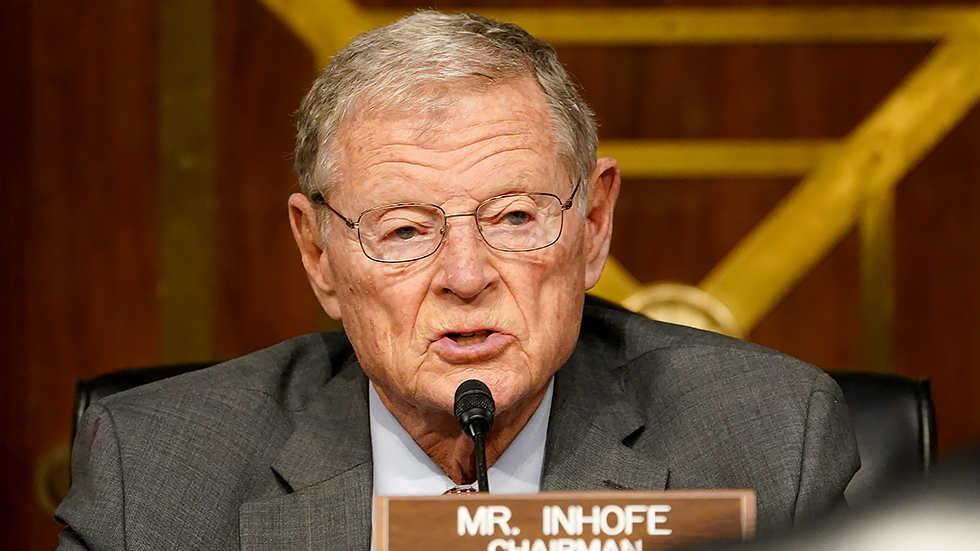Overnight Defense & National Security — Frustration with delayed NDAA grows

It’s Tuesday, welcome to Overnight Defense & National Security, your nightly guide to the latest developments at the Pentagon, on Capitol Hill and beyond. Subscribe here: digital-release.thehill.com/newsletter-signup.
Senate Republicans are not happy with Democratic leadership for their decision not to push ahead the annual defense authorization bill and bring it to the floor for a vote.
We’ll share details on the issue plus the newly released details on the secretive submarine accident last month and the new nominee to be the next vice chairman of the Joint Chiefs of Staff.
For The Hill, I’m Ellen Mitchell. Write to me with tips: emitchell@digital-release.thehill.com.
Let’s get to it.
GOP senators hit Dems over military spending

GOP senators on Tuesday accused Democrats of focusing too much on President Biden’s domestic agenda instead of helping the military by passing the nearly $780 billion National Defense Authorization Act (NDAA).
“When asked the question, ‘Why are we not getting floor time?’ There’s not an answer,” Senate Armed Services Committee ranking member Jim Inhofe (R-Okla.), said during a GOP press conference.
Why the delay?: Sen. Dan Sullivan (R-Alaska) said Senate Majority Leader Charles Schumer (D-N.Y.), who controls the agenda, “won’t bring up the NDAA” to the floor, alleging that “the military in this White House and this Congress is simply not prioritized.”
Schumer has not announced his plans for the bill, but the Senate has been preoccupied with two major bills the White House hopes will be passed, including a $1.75 trillion “human infrastructure” package and a more traditional roads and bridges bill that has bipartisan support.
Democrats are looking to finalize those bills in the next several weeks.
Background on the NDAA: The must-pass NDAA, which would fund the Defense Department and some programs in the Energy Department for 2022, is typically considered and passed on a bipartisan basis.
This year’s bill includes language allowing for an annual military pay raise, funding for programs and equipment to deter Russia and China and major changes to the Uniform Code of Military Justice dealing with sexual assault and harassment.
The House passed its version of the NDAA in September, but a version the Senate Armed Services Committee passed in July has been awaiting a full chamber vote since then.
Accusations: The GOP senators pointed to the delay as proof that the military is low on the list of priorities for Democratic leaders.
Sen. John Thune (R-N.D.), said Democrats “have been so preoccupied with passing their reckless tax-and-spending spree that they have overlooked and ignored some of the basic responsibilities of governing.”
Time is also running out in 2021, with only four weeks left of legislative work on the congressional calendar.
China: US not transparent on submarine accident

China on Tuesday said the United States lacked “transparency and responsibility” after the U.S. Navy admitted one of its submarines had struck an underwater mountain in the South China Sea last month.
Limited details: The USS Connecticut, a nuclear-powered fast attack submarine, “grounded on an uncharted seamount while operating in international waters in the Indo-Pacific region,” the U.S. 7th Fleet said in a Monday statement.
The incident, which injured 11 crew members, happened on Oct. 2, but the Navy did not report it until five days later. The service also hasn’t fully explained how the mistake happened or how damaged the vessel is.
What China wants: China now demands the U.S. “give a detailed account of the accident,” Foreign Ministry spokesman Wang Wenbin said at a daily briefing, according to The Associated Press.
Wang also said Washington has failed to give “a clear explanation” of why the Navy submarine was in the contested waterway and “the specific location of the accident, whether it was in another country’s exclusive economic zone or even territorial waters, whether it caused a nuclear leak or damaged marine environment.”
Simmering tensions: The collision took place in the midst of growing tensions between the United States and China, which claims sovereignty over nearly the entire South China Sea and has built up artificial islands to house its military assets.
But Washington has stressed that the waterway — a vital shipping lane for trillions of dollars of international trade annually — must maintain freedom of navigation. The U.S. military has regularly enforced that stance with naval patrols, training missions and flights in the region.
The White House’s pick for Joint Chiefs No. 2

President Biden has nominated the head of U.S. Fleet Forces Command to serve as the Joint Chiefs of Staff’s No. 2 officer, the Pentagon announced Tuesday.
The White House nominated Navy Adm. Christopher Grady to serve as the vice chairman of the Joint Chiefs less than a month before the current vice chair, Gen. John Hyten, is set to retire on Nov. 20, according to a Defense Department statement.
The nomination, which was submitted to the Senate Armed Services Committee on Monday and posted to Congress.gov on Tuesday.
A worrisome delay: Because of Grady’s late nomination date, there will likely be a gap between Hyten’s retirement and Grady’s potential confirmation, a concern that lawmakers have voiced.
“The vice chairman of the Joint Chiefs of Staff has to retire, by statute, in less than three weeks. That’s a really important position. . . . Almost certainly, we’re going to have an absent vice chairman,” Sen. Dan Sullivan (R-Alaska) said Tuesday during a press appearance on the annual defense authorization bill.
Concerns: Sullivan and other Republican senators appeared unaware that Grady had been nominated for the Joint Chiefs role.
“If we got it last night, that’s news to me, I’ve been tracking this very closely,” Sullivan said. “But if we got it, it’s still very unlikely, in terms of meetings, in terms of hearings, in terms of floor time — this will be a vote that we want to take on the floor — that we’re going to get this done in the proper amount of time without having a gap.”
Hyten last week also expressed concern the nomination delay would hurt U.S. progress on electronic warfare and spectrum operations development, which the vice chair would oversee.
More on Grady: Grady, who is currently in charge of ensuring that the Navy’s fleet is manned, trained and equipped before being deployed, had been interviewing at the White House since spring for the vice chair nomination.
Grady, head of Norfolk, Va.,-based Fleet Forces since February 2019, beat out other contenders for the Joint Chiefs job including U.S. Strategic Command head Adm. Charles Richard.
ON TAP FOR TOMORROW
- Stand Together and Charles Koch Institute will host an event on “Advancing Security: Realism, Restraint, and the Future of U.S. Foreign Policy,” 8:30 a.m.
- The Aspen Institute will continue with its “2021 Aspen Security Forum,” with speakers including Joint Chiefs of Staff Chairman Gen. Mark Milley, U.S. Cyber Command and National Security Agency head Gen. Paul Nakasone and former Secretary of State Condoleezza Rice, among others, at 9 a.m.
- The Stimson Center will hold a discussion on “South Asian Security Issues: Views from Emerging Analysts,” at 9 a.m.
- A House Inteligence subcomitteee will hold a hearing on “Countering Domestic Terrorism,” at 9:30 a.m.
- The House Foreign Affairs Committee will hold a hearing on “Assessing Progress and Challenges in State Department Management, Operations, and Reforms,” at 10 a.m.
- The House Homeland Security Committee will hold a hearing on “Evolving the U.S. Approach to Cybersecurity: Raising the Bar Today to Meet the Threats of Tomorrow,” at 10 a.m.
- The Senate Foreign Relations Committee will hold a hearing on an “Update on U.S. Cybersecurity Policy,” at 10 a.m.:
WHAT WE’RE READING
-
Oklahoma Gov. asks Pentagon to drop vaccine mandate for National Guardsmen
-
China appears to make ‘significant progress’ in building missile silos, report says
-
Taliban forbid use of US dollar, other foreign currency
-
Taiwan increasing training of reserve forces
-
Australian leader attacks Macron’s credibility
-
The Hill: Opinion: America must get a lot better at playing the new ‘Great Game’
-
The Hill: Opinion: Putting chemical weapons questions to Russia backfired
That’s it for today. Check out The Hill’s defense and national security pages for the latest coverage. See you Wednesday.
{mosads}
Copyright 2023 Nexstar Media Inc. All rights reserved. This material may not be published, broadcast, rewritten, or redistributed.

